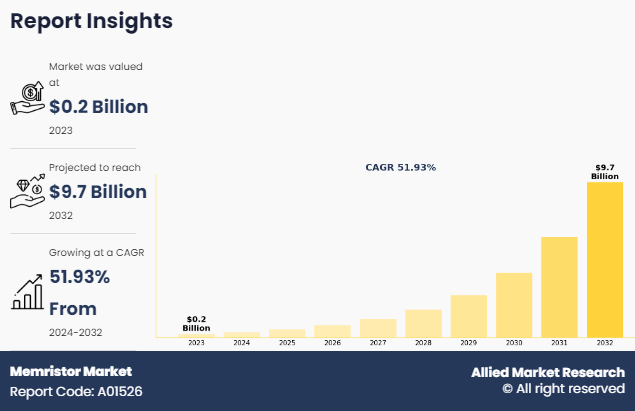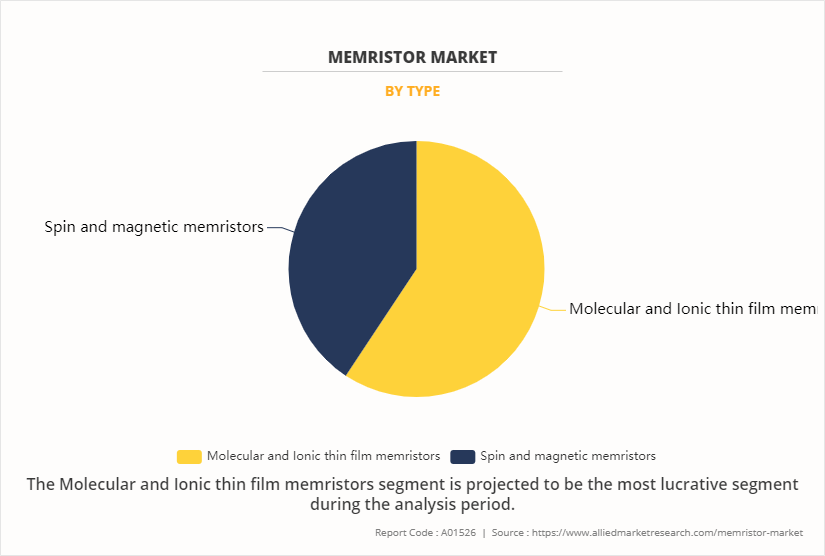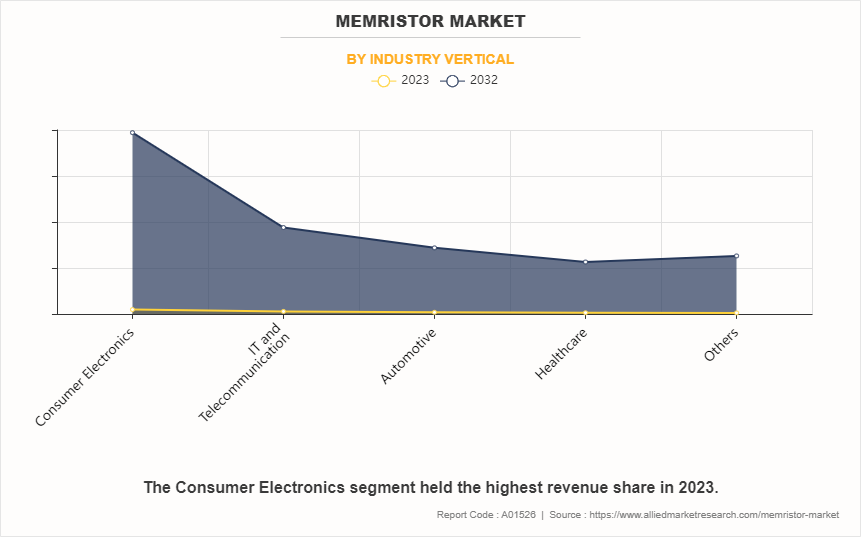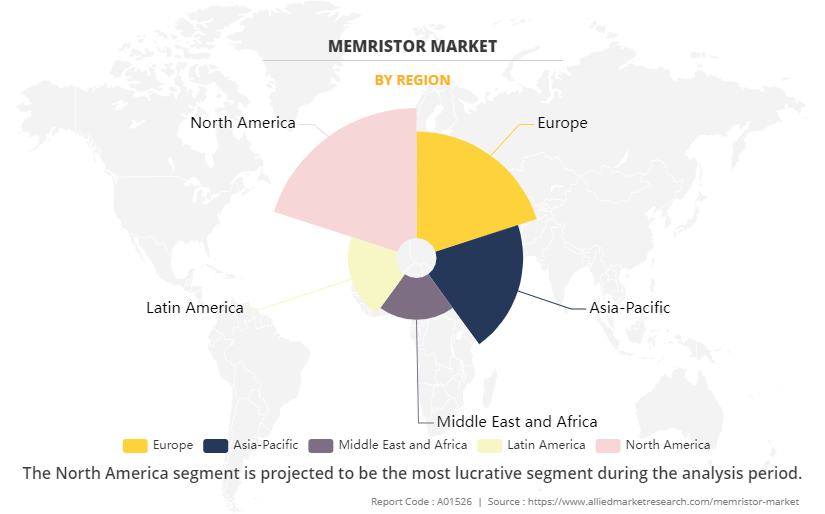Memristor Market Research, 2032
The Global Memristor Market was valued at $0.2 billion in 2023, and is projected to reach $9.7 billion by 2032, growing at a CAGR of 51.93% from 2024 to 2032.
A memristor is a non-volatile electrical type of memory that limits or regulates the flow of electrical current in a circuit that controls the flow of electric current and retains the quantity of charge that passed through it in the past. It is a two-terminal electrical type of memory resistor that links electric charge and magnetic flux, and its resistance can be programmed and subsequently remains stored. Memristors are important as they are non-volatile, which means they retain memory without power.

The memristor market is expected to witness notable growth owing to increase in demand for IoT, cloud computing, and big data. Moreover, the growing adoption of edge computing solutions is expected to provide lucrative opportunities for the growth of the market during the forecast period. On the contrary, the complexity in technological application limits the growth of the memristor market.
Key Takeaways of Memristor Market Report
On the basis of type, the Molecular and Ionic thin film memristors segment dominated the memristor market size in terms of revenue in 2023. However, the Spin and magnetic memristors segment is anticipated to grow at the fastest CAGR during the forecast period.
On the basis of industry vertical, the Consumer Electronics segment dominated the memristor market size in terms of revenue in 2022. However, the Others segment is anticipated to grow at the fastest CAGR during the forecast period.
Region-wise, North America generated the largest revenue in 2022. However, Asia-Pacific is anticipated to grow at the highest CAGR during the forecast period
Segment Overview
The memristor market is segmented into type, industry vertical, and region.

On the basis of type, the market is divided into molecular & ionic thin film memristors, and spin and magnetic memristors. In 2023, the molecular & ionic thin film memristors dominated the memristor market Insights in terms of revenue. Moreover, the spin and magnetic memristors segment is projected to have the highest CAGR during the forecast period.

On the basis of industry vertical, the memristor market value is classified into consumer electronics, IT and telecom, automotive, healthcare, and others. In 2023, the consumer electronics segment dominated the market in terms of revenue. However, the Others segment is expected to manifest the highest CAGR during the forecast period.

On the basis of Region, the memristor market size by country is analyzed across North America (the U.S., Canada, and Mexico), Europe (the UK, Germany, France, Italy, and the rest of Europe), Asia-Pacific (China, Japan, India, South Korea, and rest of Asia-Pacific), Latin America (Brazil, Argentina, and rest of Latin America), and Middle East and Africa (UAE, Saudi Arabia, Qatar, and rest of Middle East and Africa).
Asia-Pacific, specifically China, remains a significant participant in the memristor market due to high investments in the consumer electronics sector, which is driving the growth of the memristor circuity in Asia-Pacific region.
Competitive Analysis
Memristor companies profiles in the report such as Crossbar Inc., Panasonic Corporation, 4DS Memory Limited, Micron Technologies Inc., Samsung Group, Sony Corporation, Intel Corporation, IBM Corporation, SK Hynix Inc., and Toshiba Corp. are provided in this report. Product launch and acquisition business strategies were adopted by the major Memristor market share by company in 2023.
Market Dynamics
Rise in demand for IoT, cloud computing, and big data
The rise in demand for IoT, cloud computing, and big data solutions is a driving factor for the memristor market. With the widespread deployment of IoT devices, there is a pressing need for energy-efficient memory solutions capable of managing the substantial data influx from interconnected devices. Memristors, renowned for their high-density storage, low power consumption, and swift data processing, make them an optimal option for IoT applications that prioritize energy efficiency and the integrity of data. Moreover, in cloud computing and big data analysis, memristors play a pivotal role by facilitating rapid data storage and retrieval, thereby expediting the processing and interpretation of extensive datasets. Their persistent memory feature ensures data reliability and consistency, effectively addressing the scalability and performance demands of contemporary cloud-based and big data systems. As these technologies continue to evolve and expand, the demand for memristors is expected to grow, driving innovation and adoption in the memristor growth drivers.
Rise in adoption of edge computing solutions
The increase in adoption of edge computing solutions presents a significant opportunity for memristor market growth. Edge computing, which involves processing data closer to its source rather than relying solely on centralized data centers, is gaining traction due to its ability to reduce latency, enhance privacy, and improve overall system efficiency. Memristors, with their low power consumption, high-speed data processing capabilities, and non-volatile memory characteristics, are well-suited for edge computing applications. By enabling fast and efficient data storage and retrieval at the edge, memristors support the development of responsive and agile edge devices and systems. In addition, their durability and reliability make them ideal for harsh environmental conditions often encountered in edge deployments, further enhancing their appeal. As edge computing continues to evolve and expand across various industries, the demand for memristors as integral components of edge devices and systems is expected to grow, creating opportunities for innovation and expansion in the memristor industry.
Complexity in Technological Application
The complexity inherent in integrating memristor technology into various technological applications poses a significant restraint for the memristor market. While memristors offer compelling advantages such as high-speed data processing, low power consumption, and non-volatile memory, their implementation often requires intricate adaptation and integration efforts. This complexity arises from factors such as compatibility challenges with existing infrastructure, variability in performance across different applications, and the need for specialized expertise in memristor technology. Also, lack of standardized protocols and specifications further limits the adoption process, leading to uncertainties for both manufacturers and end users. As a result, the complexity associated with incorporating memristors into technological applications acts as a barrier to widespread adoption, hindering the market growth and penetration across various sectors.
Historical data and information
The memristor market forecast is highly competitive, owing to the strong presence of existing vendors. Memristor companies with extensive technical and financial resources are expected to gain a competitive advantage over their competitors as they cater to market demands. The competitive environment in this market is expected to rise as technological innovations, product extensions, and different strategies adopted by key vendors increase.
Recent Developments in Memristor Industry
In February 2022, Rain Neuromorphics Inc., a startup designing memristor chip that mimic how the brain works and aims to serve companies using artificial intelligence (AI) algorithms, raised $25 million. The chips are designed by adding a memristor circuit on top of silicon wafers. Rain Neuromorphics Inc. plans to expand its market presence with the recent injection of funds in memristor neuromorphic computing.
Key Benefits For Stakeholders
This memristor industry report provides a quantitative analysis of the memristor chip market segments, current trends, estimations, and dynamics of the memristor market analysis from 2023 to 2032 to identify the prevailing memristor market opportunities.
- The market research is offered along with information related to key drivers, restraints, and opportunities.
- Porter's five forces analysis highlights the potency of buyers and suppliers to enable stakeholders make profit-oriented business decisions and strengthen their supplier-buyer network.
- In-depth analysis of the memristor market segmentation assists to determine the prevailing memristor neuromorphic computing market opportunities.
- Major countries in each region are mapped according to their revenue contribution to the global market.
- Memristor manufacturer positioning facilitates benchmarking and provides a clear understanding of the present position of the market players.
- The report includes the analysis of the regional as well as global memristor market trends, key memristor manufacturer, market segments, application areas, and market growth strategies.
Memristor Market Report Highlights
| Aspects | Details |
| Market Size By 2032 | USD 9.7 billion |
| Growth Rate | CAGR of 51.9% |
| Forecast period | 2023 - 2032 |
| Report Pages | 250 |
| By Type |
|
| By Industry Vertical |
|
| By Region |
|
| Key Market Players | Toshiba Corp, Crossbar Inc., Micron Technologies Inc, 4DS Memory Limited, Samsung Group, SK HYNIX INC., Sony Corporation, IBM Corporation, Panasonic Corporation, Intel Corporation |
Analyst Review
Memristor is a component, which offers the feature of resistance as well as memory unit in an electronic circuit. One of the several key qualities of memristors are that they can be used as an analog component as well as a digital component in the same circuit. Memristor industry has emerged as a viable substitute provider of the flash memories across various applications. They have a number of advantages over flash memories, some of these include, less read and write time, high endurance, increased speed, wide operating temperature, and they can keep the value stored in them safe as the power goes off.
The major applications of memristor device include, portable electronic products, automotive vehicles, industrial robots, servers, and data centers. In addition, they are also very useful in neural networking and artificial intelligence. They were first conceptualized in 1970, however, it took 37 years to develop first working prototype of memristors, which was developed by Hewlett-Packard in 2008. Currently, the memristor market is in its nascent phase of commercialization with a less number of players. The key players in the memristor market focus extensively on R&D of the memristors.
Molecular & Ionic Film Memristor account for the majority of memristor market share in the by type segment of the market owing to their wide operating temperature range and application in potential storage class memory. However, in years to come, spin based & magnetic memristor is anticipated to grow with a fast pace owing to increase in their adoption in place of dynamic as well as static RAMs in electronic devices.
The memristor market size in North America and Europe regions is on a continuous rise owing to the presence of countries that have major players working in the memristor market. Furthermore, the Asia-Pacific memristor market size is anticipated to grow very rapidly in years to come, as memristors find their extensive usage in electronics devices. Asia-Pacific region has a large number of countries, which contribute a major share in the overall electronics market. Also, the increase in number of vehicles which use memories in their electronic control unit and infotainment systems will foster the growth in memristor market during the years to come.
Key players in the memristor industry such as HP development company, Knowm Inc., Micron Technology, Inc., and Panasonic Corporation, are engaged in the process of product innovation, collaboration, and acquisition to further expand their services in memristor market across various geographies.
Advancements in Neuromorphic Computing, and Integration in Internet of Things (IoT) Devices are the upcoming trends of memristor market in the world.
Consumer Electronics the leading application of memristor market
North America is the largest regional market for Memristor.
In 2022, $0.2 Billion is the estimated industry size of memristor.
Crossbar Inc., Panasonic Corporation, 4DS Memory Limited, Micron Technologies Inc., Samsung Group, Sony Corporation, Intel Corporation, IBM Corporation, SK Hynix Inc., and Toshiba Corp. are the top companies to hold the market share in memristor
Loading Table Of Content...
Loading Research Methodology...



